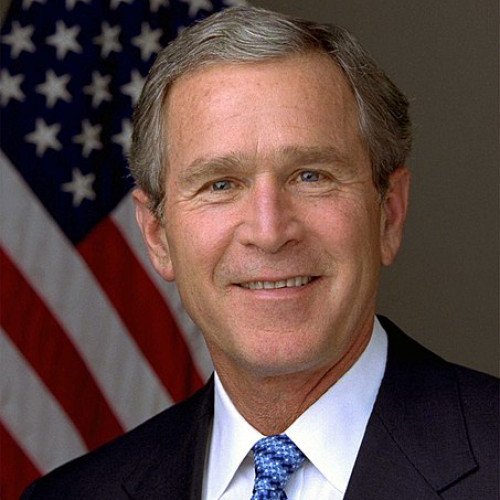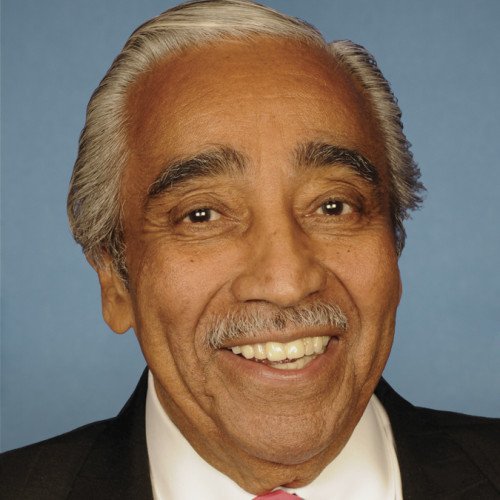George W. Bush VS Charles B. Rangel

George W. Bush
George Walker Bush (born July 6, 1946) is an American politician and businessman who served as the 43rd president of the United States from 2001 to 2009. A member of the Republican Party, he had previously served as the 46th governor of Texas from 1995 to 2000. Born into the Bush family, his father, George H. W. Bush, served as the 41st president of the United States from 1989 to 1993. Bush is the eldest son of Barbara and George H. W. Bush. As such he is the second son of a former United States president to himself become the American president, with the first being John Quincy Adams, the son of John Adams. He flew warplanes in the Texas and Alabama Air National Guard. After graduating from Yale College in 1968 and Harvard Business School in 1975, he worked in the oil industry. Bush married Laura Welch in 1977 and unsuccessfully ran for the U.S. House of Representatives shortly thereafter. He later co-owned the Texas Rangers baseball team before defeating incumbent Ann Richards in the 1994 Texas gubernatorial election. As governor, Bush successfully sponsored legislation for tort reform, increased education funding, set higher standards for schools, and reformed the criminal justice system. Bush also helped make Texas the leading producer of wind powered electricity in the U.S. Bush was elected president in 2000 when he defeated Democratic incumbent Vice President Al Gore after a narrow and contested win that involved a Supreme Court decision to stop a recount in Florida. He became the fourth person to be elected president without a popular vote victory. Upon taking office, Bush pushed through a $1.3 trillion tax cut program and the No Child Left Behind Act, a major education reform bill. He also pushed for socially conservative efforts, such as the Partial-Birth Abortion Ban Act and faith-based welfare initiatives. In response to the September 11 terrorist attacks, Bush created the Department of Homeland Security and launched a "War on Terror" that began with the war in Afghanistan in 2001. He also signed into law the controversial Patriot Act in order to authorize surveillance of suspected terrorists. In 2003, Bush ordered an invasion of Iraq, beginning the Iraq War, with the administration arguing that the Saddam Hussein regime possessed an active weapons of mass destruction (WMD) program, and that the Iraqi government posed a threat to the U.S. Some administration officials falsely claimed that Hussein had an operational relationship with Al-Qaeda, the perpetrators of the 9/11 attack. No stockpiles of WMDs or an active WMD program were ever found in Iraq. Bush also signed into law the Medicare Modernization Act, which created Medicare Part D, and funding for the AIDS relief program known as PEPFAR. Bush was re-elected to a second term in the 2004 presidential election, defeating Democratic Senator John Kerry in a close race. During his second term, Bush reached multiple free trade agreements and successfully nominated John Roberts and Samuel Alito to the Supreme Court. He sought major changes to Social Security and immigration laws, but both efforts failed. The wars in Afghanistan and Iraq continued, and in 2007 he launched a surge of troops in Iraq. Bush received criticism from across the political spectrum for his handling of Hurricane Katrina, and the midterm dismissal of U.S. attorneys. Amid this criticism, the Democratic Party regained control of Congress in the 2006 elections. In December 2007, the U.S. entered the Great Recession, prompting the Bush administration to obtain congressional approval for multiple economic programs intended to preserve the country's financial system, including the Troubled Asset Relief Program (TARP) to buy toxic assets from financial institutions. Bush was among the most popular, as well as unpopular, U.S. presidents in history; he received the highest recorded approval ratings in the wake of the 9/11 attacks, but one of the lowest such ratings during the 2008 financial crisis. Bush finished his second term in office in 2009 and returned to Texas. In 2010, he published his memoir, Decision Points. His presidential library opened in 2013. His presidency has been rated as below-average in historical rankings of U.S. presidents, although his public favorability ratings have improved since leaving office.
Statistics for this Xoptio

Charles B. Rangel
Charles Bernard Rangel (; born June 11, 1930) is an American politician who was a U.S. Representative for districts in New York from 1971 to 2017. A member of the Democratic Party, he was the second-longest serving incumbent member of the House of Representatives at the time of his retirement, serving continuously since 1971. As its most senior member, he was also the Dean of New York's congressional delegation. Rangel was the first African-American Chair of the influential House Ways and Means Committee. He is also a founding member of the Congressional Black Caucus. Rangel was born in Harlem in Upper Manhattan and lives there to this day. He earned a Purple Heart and a Bronze Star for his service in the U.S. Army during the Korean War, where he led a group of soldiers out of a deadly Chinese army encirclement during the Battle of Kunu-ri in 1950. Rangel graduated from New York University in 1957 and St. John's University School of Law in 1960. He then worked as a private lawyer, Assistant U.S. Attorney, and legal counsel during the early-mid-1960s. He served two terms in the New York State Assembly, from 1967 to 1971, and then defeated long-time incumbent Congressman Adam Clayton Powell Jr. in a primary challenge on his way to being elected to the House of Representatives. Once there, Rangel rose rapidly in the Democratic ranks, combining solidly liberal views with a pragmatic approach towards finding political and legislative compromises. His long-time concerns with battling the importation and effects of illegal drugs led to his becoming chair of the House Select Committee on Narcotics, where he helped define national policy on the issue during the 1980s. As one of Harlem's "Gang of Four", he also became a leader in New York City and State politics. He played a significant role in the creation of the 1995 Upper Manhattan Empowerment Zone Development Corporation and the national Empowerment Zone Act, which helped change the economic face of Harlem and other inner-city areas. Rangel is known both for his genial manner, with an ability to win over fellow legislators, and for his blunt speaking; he has long been outspoken about his views and has been arrested several times as part of political demonstrations. He was a strong opponent of the George W. Bush administration and the Iraq War, and he put forth proposals to reinstate the draft during the 2000s. Beginning in 2008, Rangel faced a series of personal legal issues focusing on ethics violations and allegations of failures to abide by the tax laws. The House Ethics Committee focused on whether Rangel improperly rented multiple rent-stabilized New York apartments, improperly used his office in raising money for the Rangel Center at the City College of New York, and failed to disclose rental income from his villa in the Dominican Republic. In March 2010, Rangel stepped aside as Ways and Means Chair. In November 2010, the Ethics Committee found Rangel guilty of 11 counts of violating House ethics rules, and on December 2, 2010, the full House approved a sanction of censure against him. During the 2012 and 2014 elections, Rangel faced two strong primary challenges in a now primarily Hispanic district but prevailed. He did not run for re-election in 2016 and left office in January 2017.